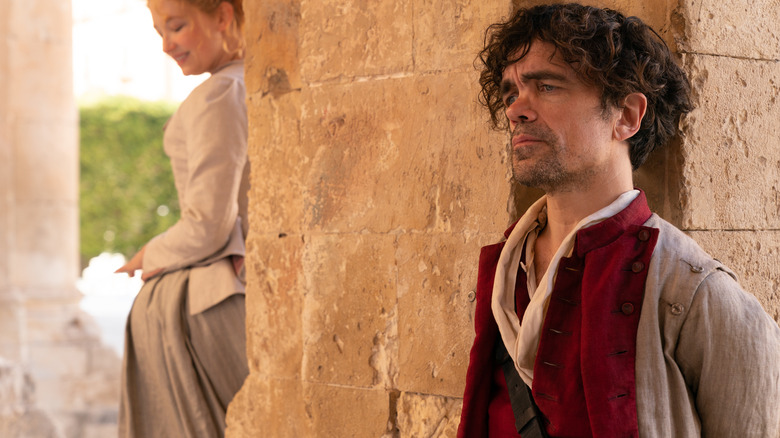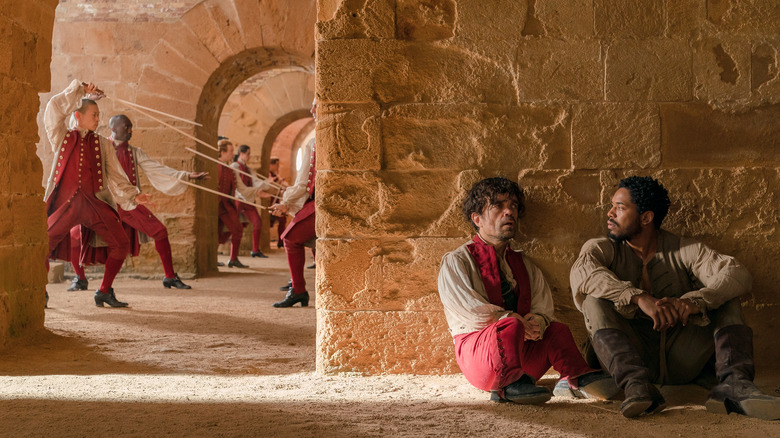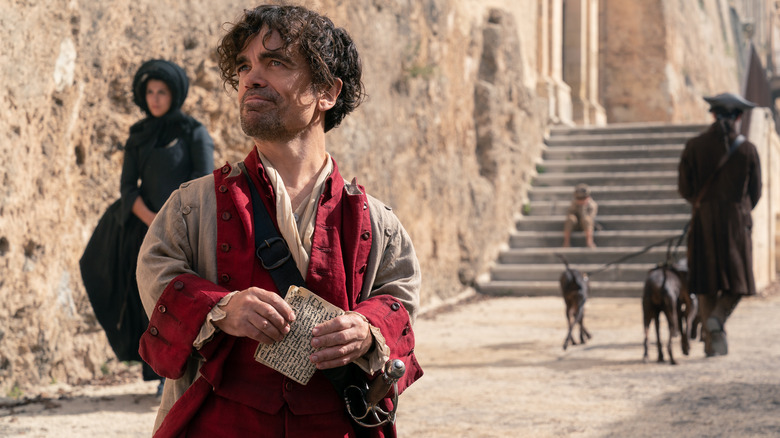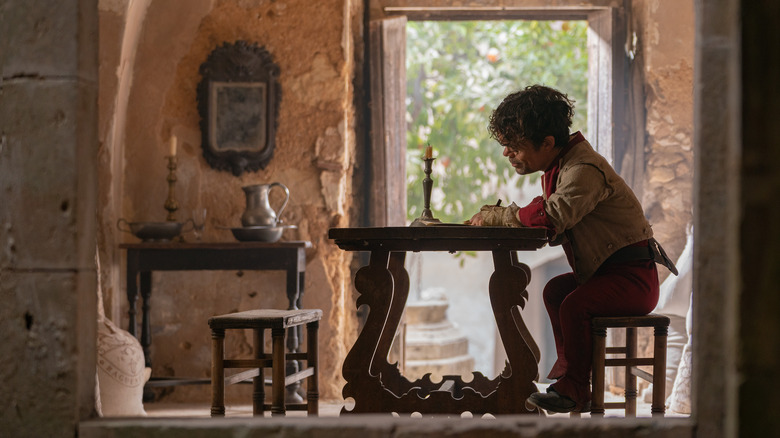Cyrano Star Peter Dinklage On Singing Live And The Unlimited Potential Of Classic Characters [Interview]
Peter Dinklage spent many memorable years playing Tyrion Lannister, the lovable smartass who drinks and knows things on "Game of Thrones." Years after retiring the role, he does plenty of those same things in his latest turn as Cyrano de Bergerac — downing alcohol and weaving pretty word tapestries — but he also gets to do something new. Dinklage shines as a romantic lead in this updated take on Edmond Rostand's 1897 play, which screenwriter Erica Schmidt and director Joe Wright transform into a musical fantasy. Here, DInklage is someone to swoon over and root for, as a ferocious swordsman and brilliant wordsmith, hopelessly in love with his childhood friend Roxanne (Haley Bennett) but unable to speak his affections aloud, too afraid of her possible rejection. Before he gets the chance to share his true feelings, Roxanne goes the love-at-first-sight route with a soldier in his army, Christian (Kelvin Harrison Jr.), and Cyrano helps their love blossom by penning love letters to Roxanne with Christian's signature.
This is a story that's been told many times before — in fact, Bennet and Dinklage shared the stage in these very same roles, based on the Schmidt play that this movie adapts. But rather than that repetition deterring Dinklage, this was just more reason to embrace the role onscreen. In my conversation with the actor, Shakespeare lover, and former punk rocker, Dinklage shares why he was thrilled to warm up his voice and embody Cyrano once more.
'You remove the nose and you're left with the heart'
This interview has been lightly edited for clarity.
"Cyrano" has a lot in common with "Romeo and Juliet," or other stories that keeps coming back. We keep returning to them, even though we've seen them play out, and I was curious about what drew you into "Cyrano" in the first place.
Well, I love being a part of stories that are hundreds of years old and that will continue to be played hundreds of years into the future. It's a great sort of communal feeling of being a part of a long line of performers from anything from Shakespeare to Chekov to Rostand's Cyrano. It's a thrill and an honor to play these classic roles. With "Cyrano," this adaptation of Erica Schmidt specifically, it really, really spoke to me because I always thought, "It's an actor and a fake nose." I thought it was pretty theatrical, and I think when Rostand wrote it 120 years ago, it was probably way ahead of its time, and the prosthetic nose was revolutionary and something that had never been done before in that way. But for me in 2021, the only way it sparked with me was to remove that nose. That's what Erica Schmidt did — without my involvement. She had always planned in her adaptation to ask yourself what happens if you remove Cyrano's most famous attribute. What are you left with? And I loved that notion, because it seemed much more universal, suddenly. It seemed to speak to all of our longings and insecurities in the face of love and basically, it gets rid of all the language of the nose. So you're left with just the heart of it.
You remove the nose, you're left with the heart, and that's what she did. Then obviously having the brilliant, inspired idea of replacing the long monologues of love with love songs written by The National, that was incredibly inspired as well. That's the fun part about adapting these old stories: You've got to know why you're updating it. If you put Romeo and Juliet in a parking garage, don't just do it because it's new and fresh. Have a reason to support it. I think what Erica did was really supported and done for good reason.
I've heard you talk about Christian as this misunderstood figure because people dismiss him as being stupid or naive. To your point, the movie takes a different approach to his character.
I think in many ways Christian's the most complex character. Even though he doesn't have the poetic way with words, he is the only one that I think really, truly understands what love is. Everyone else speaks of love, but I feel like Christian's the one that actually really feels it, because he's the one who — he doesn't put himself before love. When he realizes that Cyrano is in love with Roxanne, he steps aside. He takes himself out of it, which is so noble and generous and intelligent.
In the past, he's been played as sort of a dolt, but I think his kindness is mistaken for a lack of intelligence. I think that's true in life. I think if you're kind and really open-minded, you seem a little bit naive and therefore stupid, as opposed to if you're cynical and dark, it's understood as something intelligent. That's not necessarily the case. I think with Christian and especially in Kelvin's performance of it, he's just so open and that's really important.
That's a really interesting note to hear from you, since you've played so many of those cynically, intelligent characters. Including Cyrano.
It's funny that we also equate people who talk a lot with intelligence. [Laughs] I know a lot of people who talk a lot that maybe shouldn't.
'Why not? Let's jump off the cliff and see what happens'
You have this exciting, epic sword fight when Cyrano's cornered, and another one at the start of the film, when he's on stage. What was it like shooting those scenes?
Those are such a great thrill. Much like the opportunity to sing in a movie, it's just, 'Why not? Let's jump off the cliff and see what happens.' Hopefully, I won't hurt anybody or I won't get knocked in the head too many times. But also with that, it's a really satisfying feeling at the end of the day. You've accomplished something that you work really hard at. Eunice Huthart and Paul Lowe, our stunt coordinators, and all the people on their stunt team were so helpful in keeping me safe and making me look kind of cool. The stunt team is so patient with people who are in their training period, who are actors, who are outside of their comfort zone in doing something like that. You just work every day, all day for a couple of months and get it down, muscle memory. It's a thrill, and it's a dance, it's all very choreographed.
The fight where I do fighting with the 10 men was all done in one take. So you just had to do it a number of times over the course of one night. And if you mess up, you got to go back to the beginning, but it was really exciting and really fun. Once you get it right, there's no better feeling. But all credit is due to them and their patience with me and their inspired ideas about different ways of fighting and not repeating yourself too much.
Did you have a similar approach to singing? Relying on the people around you and trying and trying again?
Yeah, and it was really cool. We sang everything live and having done that, I can't imagine doing it any other way. If we recorded it and we had to lip sync like '80s music style video stuff, it would just be too funny and I would be so self-conscious. Doing it live is just like speaking text. Because Erica and Matt Berninger, and Carin Besser, the lyricists of the songs, they sort of blend it all together. It wasn't like these moments where you're talking and then you stop, the spotlight hits you, and you're singing this love song. It just seemed like one continuum from book to lyrics, which I really loved. To do it live just made it flow much better in terms of the narrative and connecting with the other actors.
We had vocal lessons, because most of us hadn't sung before in a movie or we weren't trained singers — at least I wasn't. So you get the muscle going. But I also had the history and the experience of doing this show on stage as well, a couple times. So I had an advantage there. I was familiar with the songs by that point, more so than if I just entered a film blindly.
But this wasn't your first time singing. I read that you were also in a punk rock band.
I was. My early 20s, back in the early '90s. Basically ... I was never serious about it. I just was having some drinks with some friends and screaming into a microphone and playing some music, young and silly, but we had fun. We played some Bee Gees though, so we were pretty good.
'It's not every role that you want to go back to or keep playing. They can be limited'
Was there any hesitation about taking this role then, with the musical aspect, or was that something you were excited about?
No, I was terribly excited. It's very daunting because I can sing, but I don't consider myself a singer, because if you hear singers like Matt Berninger from The National or my favorites, anybody from Nina Simone to Kurt Cobain, Stevie Wonder, Freddie Mercury. You listen to those people and, you know, there's nobody better. Nobody sounds like them. But they all have the common denominator of not trying to pretend to sing like someone else. They're not doing an imitation of another singer. They're singing from their soul. They're singing from their gut. They're singing from their toes. That's all you can attempt to do when you're singing a song, is to stop trying to do an in imitation of somebody else's voice, but sing in your voice.
I'm really curious about what it's like for you to hold on to a character. The way that, especially in a situation like "Cyrano," you go from having him night to night on stage to bringing him to screen. Do you feel like there's a shift from when you first embodied him to how you came to him in front of the camera?
Oh yeah, of course. That's part of the joy of doing something repeatedly and then different versions of it and see what happens. I had that similar experience in "Game of Thrones" with Tyrion Lannister. You get to slow burn. You track the evolution of this character and grow with him, literally grow with him, age with him. Something like "Cyrano," which from the time we started the first stage production to finish wrapping the film, it was a few years. I had changed as a person, gone through changes, and you've got to bring all that to the character, and what you've learned playing him before and what you've brought from your own life.
Does it change at all that instead of someone like Tyrion, who grows season by season, you're playing Cyrano, but through the same motions, the same series of events every time?
But there's a reason why these classical Shakespearean actors go back and play Richard III over and over again. They play Hamlet. Because every time you do it, it's the same character, the same story. But you unearth new things every single time, because they're such brilliantly drawn characters that there are things that you never saw when you first started playing the role that you now see because they have such complexity. Acting can be such an abstract, unknowable art form that you just keep finding new things, and that's such a joy and a privilege. It's not every role that you want to go back to or keep playing. They can be limited, but these classic characters, they're unlimited in what they can tell you each time you go back to them.
"Cyrano" opens in theaters on February 25, 2022.



